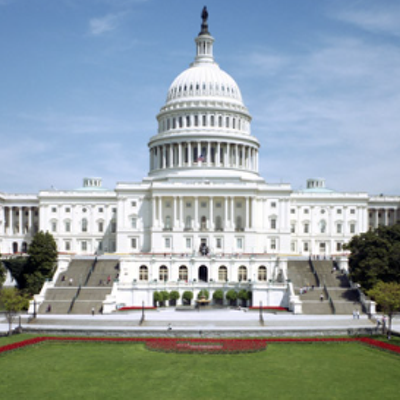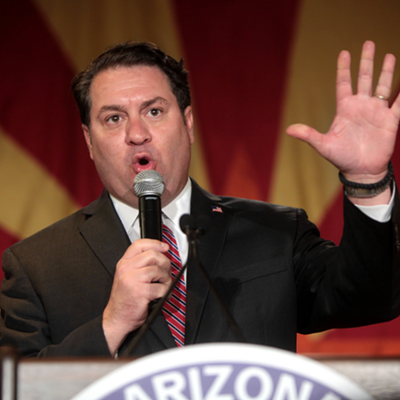THE EARMARK SHUFFLE
A couple of weeks back, we wrote about Republican Jonathan Paton's vow to eschew earmarks if he were to prevail later this year in his bid to defeat Democratic Congresswoman Gabrielle Giffords, who has said that she would also like to ban earmarks, but until that happens, she'll continue to fight to bring home money to Southern Arizona.
We expressed skepticism that Paton would have much luck persuading his fellow lawmakers to give up earmarks, given that they seem to enjoy being able to direct federal spending back to their home districts.
Shows how much we know. Last week, earmark reform was all the talk in Washington, D.C., as Democrats on the House Appropriations Committee announced a one-year ban on earmarks going to for-profit entities.
Giffords took some credit for the move, saying that it reflected a bill she co-sponsored that would have prohibited lawmakers from taking campaign contributions from senior executives or lobbyists for companies for which lawmakers had requested earmarks.
"The ban is a step in the right direction," Giffords said in a press release. "It builds on the earmark reform legislation I introduced 11 months ago and will help us strengthen oversight of how taxpayer dollars are spent. Most importantly, it will help clean up a system that was prone to abuse and allowed lobbyists to call the shots."
Paton says Giffords' call for reform is "a day late and $500 million short"—a reference to the earmarks that Giffords has requested for Southern Arizona.
Paton is in line with House Republicans, who, in an effort to outdo Democrats on earmark reform, are calling for a one-year moratorium on all earmarks, including those going to nonprofits, military bases and local governments.
How any of this will play in the U.S. Senate remains to be seen (which is why we're not quite ready to give up our skepticism), but it's obvious that both parties recognize that earmarks have become a symbol of out-of-control spending and corruption in Washington.
Whether eliminating earmarks—which account for less than 2 percent of federal spending—would make much of a difference in controlling spending is a whole 'nother question, but reform is definitely on the agenda.
Congressman Jeff Flake, a longtime critic of earmarks, is happy to see the push for reform, according to his spokesman, Matthew Specht.
"The Democrats in the House took a pretty major step, which is outlawing earmarks that go directly to private companies," Specht says. "The day after the Democrats did that, the Republicans took it a step further and imposed a one-year moratorium on all earmarks."
Specht says that Flake, who doesn't request any earmarks, believes that the tradition of earmarking causes Congress to spend more than it otherwise would, because "once you get a couple of earmarks in a spending bill, the appropriators know they can keep adding to it, and won't lose your support for the bill."
But he acknowledges that turning down earmarks comes with a price: With Congressman John Shadegg and Sen. John McCain joining Flake in eschewing earmarks, Arizona gets less pork than other states whose members of Congress fight for earmarked projects.
"That's not to say that federal funding doesn't come to the district," Specht says. "It just doesn't come via earmarks."
Paton had told us that Southern Arizona would get more money if he didn't pursue earmarks, but he backed away from that argument earlier this week.
He concedes that if he has his way, Arizona can expect less from the federal government, because federal spending overall needs to be reined in, and citizens need to learn to live with less.
"This is all deficit spending," Paton says. "It's not real money. We're going into greater and greater debt. But we would be treated more fairly and get a bigger portion of the overall pie if we didn't have the earmark process."
AN EARLY WRAP?
Now that they've got the budget out of way, the path is clear for lawmakers to wrap up the session and get on the campaign trail.
Lawmakers we've talked to seem to think they can call Sine Die by mid-April, which would make for one of the shortest sessions in memory.
Among the bills still left in the process:
• SB 1070, a package of laws designed to make life miserable for migrant workers who have entered the country illegally, including making it illegal for anyone to pick up a worker who is in the country illegally for day labor, and requiring police officers to ask about the immigration status of people they believe may be in the country illegally.
• HB 2148, which would put married couples ahead of single people when it comes to legally adopting children in the state's foster-care program. Sen. Jack Harper, in a recent e-mail uncovered by Arizona Republic columnist E.J. Montini, told a constituent that the law was designed to prevent gays and lesbians from adopting children.
• HB 2441, which would require presidential candidates to show their birth certificate before they are allowed on the Arizona ballot.
• HB 2337, which would allow companies in Arizona to continue to manufacture incandescent light bulbs in spite of a federal law banning them in favor of more energy-efficient alternatives.
You can follow the progress of these bills, and many others, at the Tucson Weekly's Blogislature, on The Range at blog.tucsonweekly.com.
CONTINUED ACCESS
The Tucson City Council has voted 6-1 to keep Access Tucson alive next year by forcing the city's propaganda arm, Channel 12, to share its resources with the city's public-access TV station.
Part of that will require Channel 12 to move in with Access at 124 E. Broadway Blvd. That's gonna be a rough transition for Channel 12 staff.
Although it's still alive, Access Tucson has had to lay off half of its staff and will be offering reduced services.
GODDARD'S IN
Arizona Attorney General Terry Goddard formally filed his paperwork to become a candidate for governor last week.
The only Democrat in the race so far, Goddard also turned in more than 5,300 $5 contributions to qualify for Clean Elections funding, an organizational coup that means he's done fundraising for the campaign.
He'll face the winner of a crowded GOP primary that will include incumbent Gov. Jan Brewer, state Treasurer Dean Martin, Tucson attorney John Munger, political newcomer Buz Mills and several other little-known Republicans.
NO MORE R-CUBED
Democrat Ted Prezelski, one of Southern Arizona's first political bloggers, is putting Rum, Romanism and Rebellion on hiatus as he ramps up his campaign for the Arizona House of Representatives in midtown Tucson's Legislative District 28.
He's in a crowded Democratic primary that includes current LD28 Rep. Steve Farley, former LD28 chair Mohur Sidwa, former Tucson City Council member and state lawmaker Bruce Wheeler and onetime congressional candidate Tim Sultan.
Tedski, who won national attention for R-Cubed and was an official blogger at the 2008 Democratic National Convention, was a pioneer in the blogging biz. His snark and insider gossip will be missed on the 2010 campaign trail.
Speaking of LD28: You can see the House candidates at a forum from 7 to 8:30 p.m., Friday, March 19, at New Spirit Lutheran Church, 8701 E. Old Spanish Trail. The event, sponsored by Saguaro Eastside Democrats, starts at 6:30.
Find early and late-breaking Skinny at The Range, our daily dispatch.








